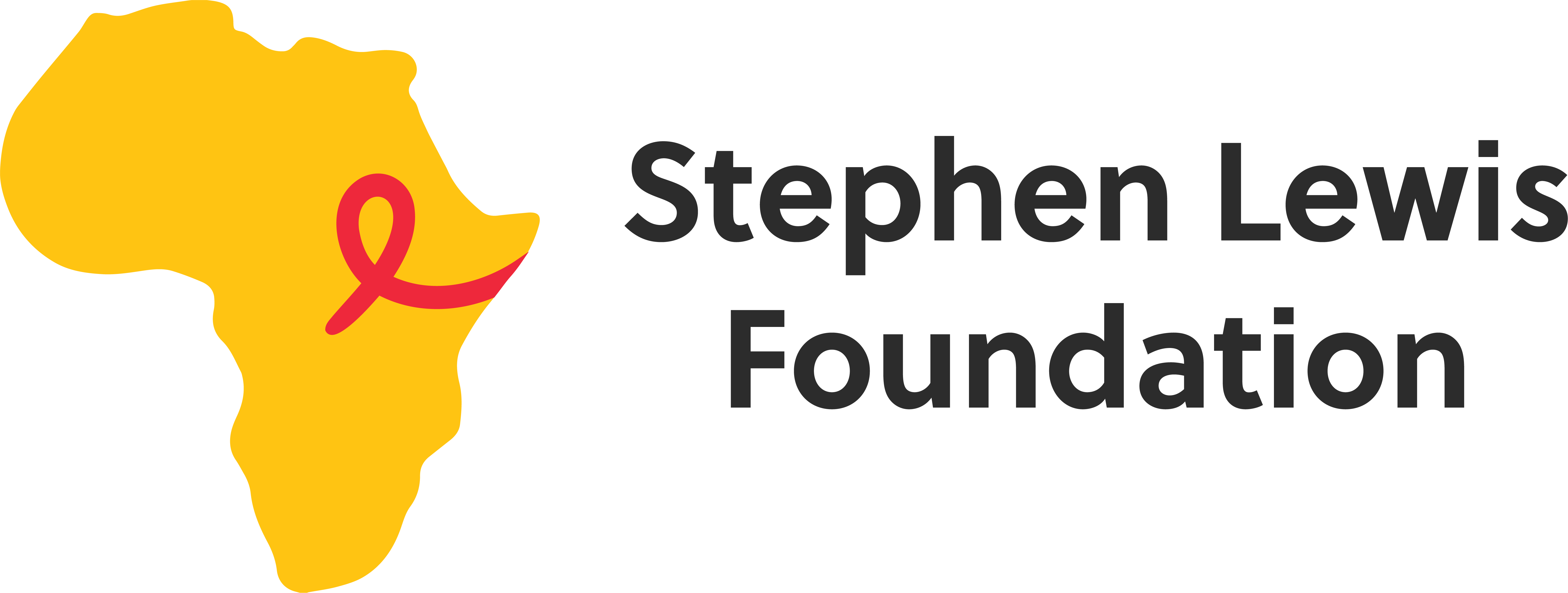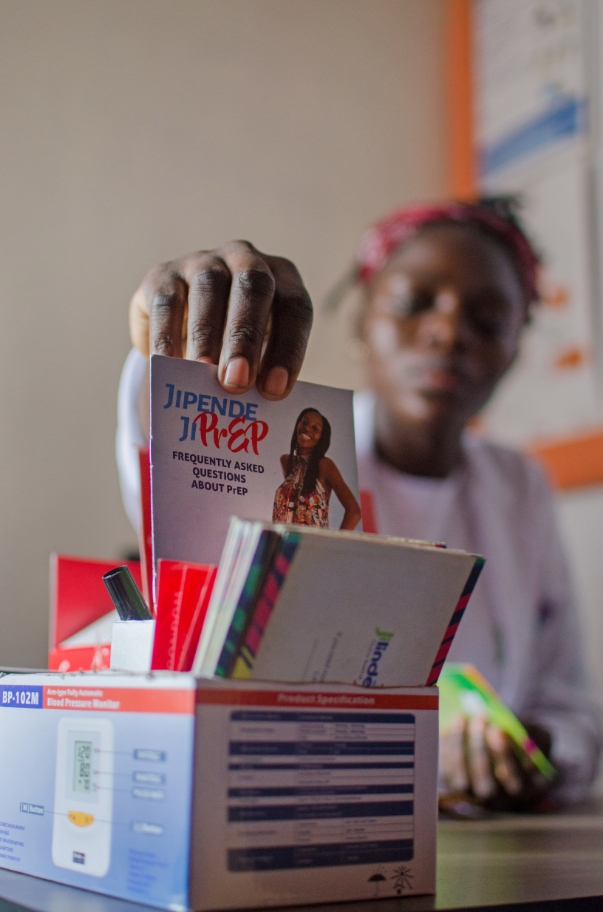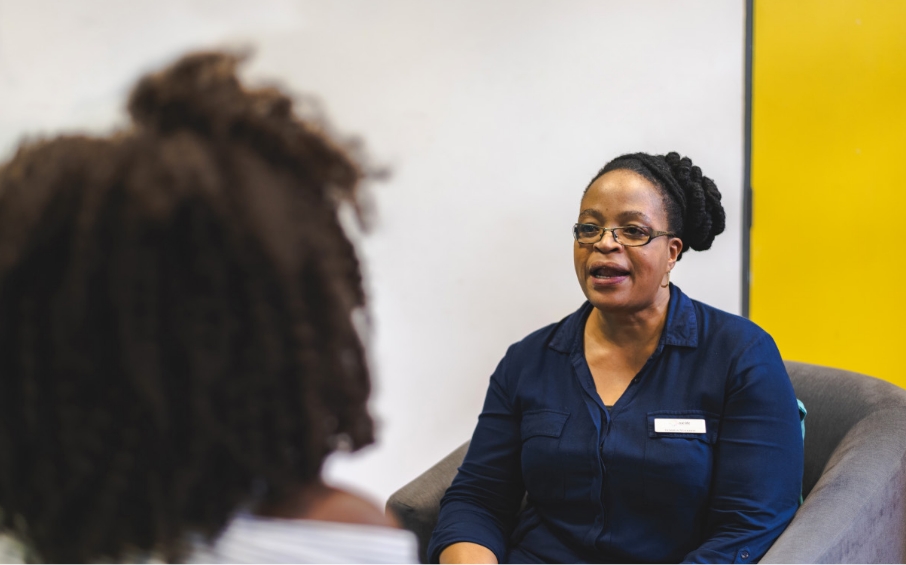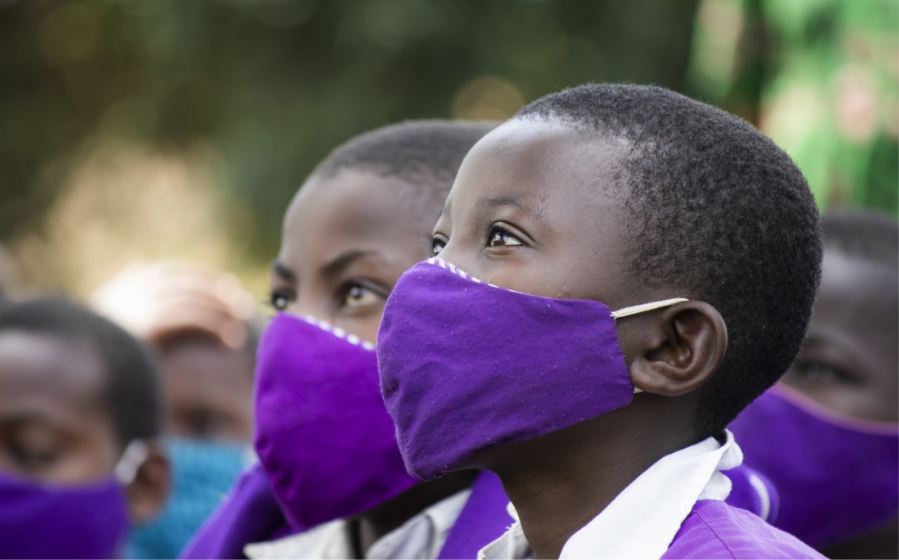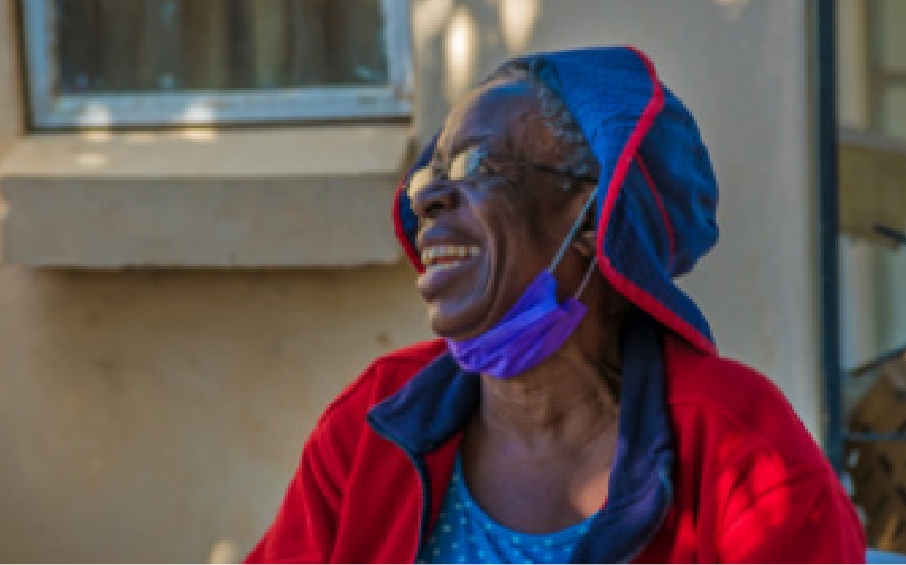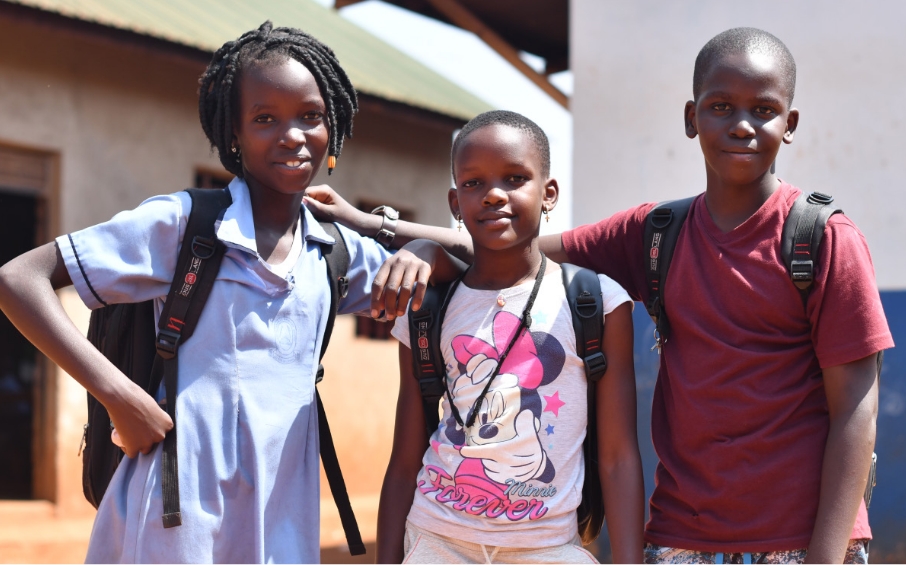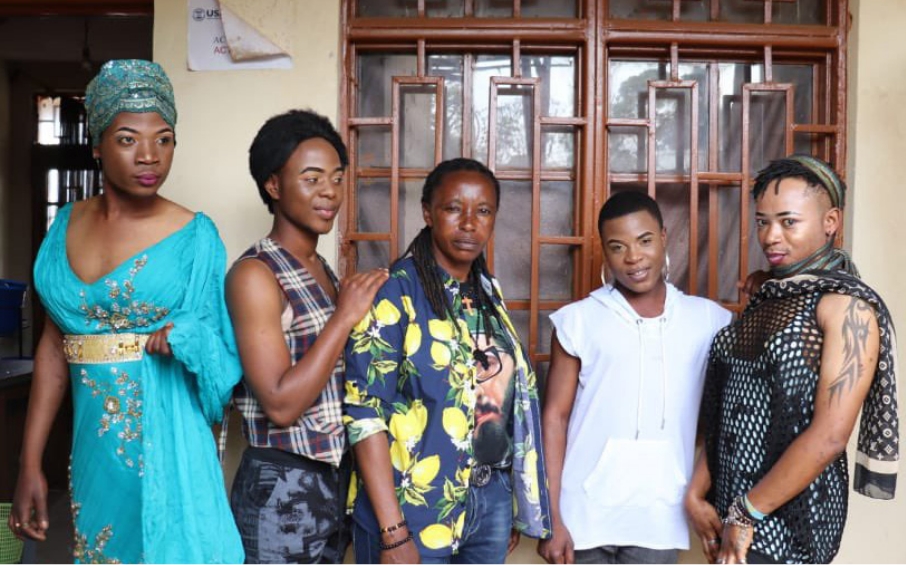Intersecting
Pandemics
2021/2022 Year in Review
Photo Credit: Siyano Photography
Description: Chiedza Child Care Centre
Location: Zimbabwe
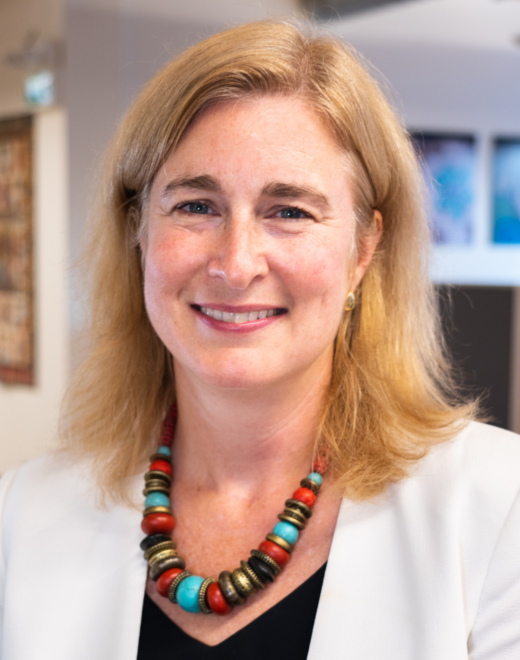
Meg French
Executive Director
It’s difficult to believe that it has been almost three years since the COVID-19 pandemic first created disruption around the world. And while we still come to terms with how it has upended our lives, we must not forget that millions of people continue to be affected by another pandemic: HIV and AIDS. For our community-led partners in sub-Saharan Africa, who had already been working for decades to respond to HIV and AIDS, the new health threat of COVID-19 also created shock and uncertainty. But very quickly these organizations, with their deep expertise, ingenuity, and resolve, rallied to respond to intersecting pandemics.
Through every wave of COVID-19 we have worked alongside them, and thanks to our donors, we continue to provide flexible support tailored to communities’ unique needs. The SLF is founded on the belief that communities have the expertise to dismantle the root causes of pandemics. The value of this model was never more apparent than in recent years, when our tireless partners battled against personal loss, lockdowns, fear, and misinformation to continue their work. I’m inspired by their commitment to health, security, and justice for their communities and, as you read stories about their impact, I know you will be too.
I am also inspired by the solidarity of Grandmothers to Grandmothers Campaign members, monthly donors, individuals, unions, foundations, and businesses. Their unwavering commitment to community-led responses to HIV has allowed the SLF to continue to provide the resources our partners need to address the rising incidents of domestic violence and teen pregnancy, loss of food and income faced by grandmothers and the children they care for, and the increased discrimination and violence experienced by LGBTIQ people resulting from COVID-19. Never has flexible funding been more important.
While COVID-19 once again laid bare disparities in global health, it has also strengthened our resolve to create a more equitable and just future. As the SLF enters our 20th year, we hope you will join us in celebrating the progress that has been made toward ending AIDS, while renewing your commitment to cutting off the inequities that drive pandemics.
In solidarity,

I am proud of the fierce determination of the Foundation to maintain its focus on the worst pandemic we’ve ever had. No matter how tough things get, whether it’s economic crisis, or COVID-19, or international conflict, the Foundation doesn’t swerve for a moment. It just keeps its head down, keeps fighting, and keeps listening to the people who it is attempting to help. It is a narrative of human devotion and determination that we never gave up and will not give up to this day.
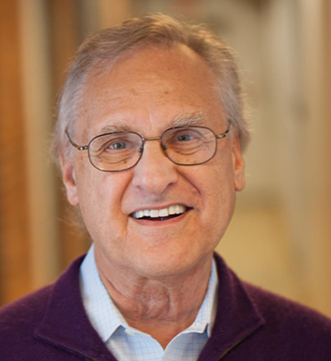
Stephen Lewis
Co-Founder and Co-Chair,
Board of Directors
VISION
An equitable and just world where all people’s right to health is realized.
MISSION
We deliver funds and other resources directly to community-led organizations who are leading responses to HIV and AIDS in sub-Saharan Africa. These organizations empower women and girls, grandmothers, orphaned and vulnerable children, LGBTIQ communities, and people living with HIV.
We advocate for global health and philanthropic communities to engage in partnering, fundraising, and international development that shifts power to community-led organizations, and dismantles the inequalities driving the HIV and AIDS pandemic.
Our Impact
The collective impact of the SLF’s partnerships is spread across
122
community-led organizations in
15
countries.
We appreciate the fruitful partnership, charity, and compassion of the SLF. Though COVID-19 has swept us back to the ground, we believe we will rise again.
We would like to thank the Foundation for their continued support: financially, emotionally, and with education. This year it wasn’t easy to cope with COVID-19 but you were there to motivate and encourage us.

In 2021, you helped us reach people through six areas of work:
Grandmothers
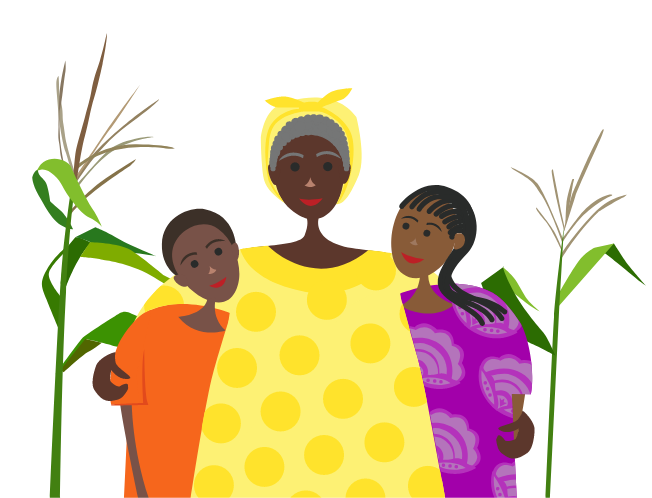
25,599
grandmothers participated in income-generating activities
49,872
grandmothers took part in support groups
Over
100,000
caregivers,
including
40,000
grandmothers received caregiving support, such as: parenting while living with HIV and AIDS; promoting HIV literacy with school councils; entrepreneurship and microfinancing; counselling to manage stress and anger; and conflict resolution
22
organizations in Kenya, Uganda, Malawi, South Africa, Ethiopia, Tanzania, and Namibia rebuilt or improved
200
homes, including over 100 headed by grandmothers

Ending violence against women and girls
19
SLF partners organizations supported almost
1100
women and children to escape violence and access shelter
13
partner
organizations
provided women with legal support, including obtaining court orders, preparing for court proceedings, and referral to paralegals
This resulted in prison sentences or protection orders issued against
60
offenders
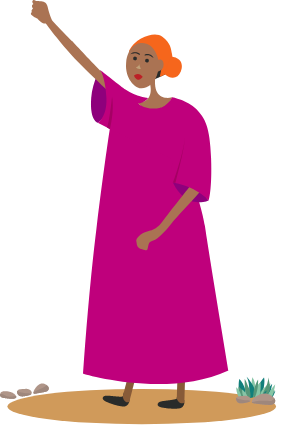
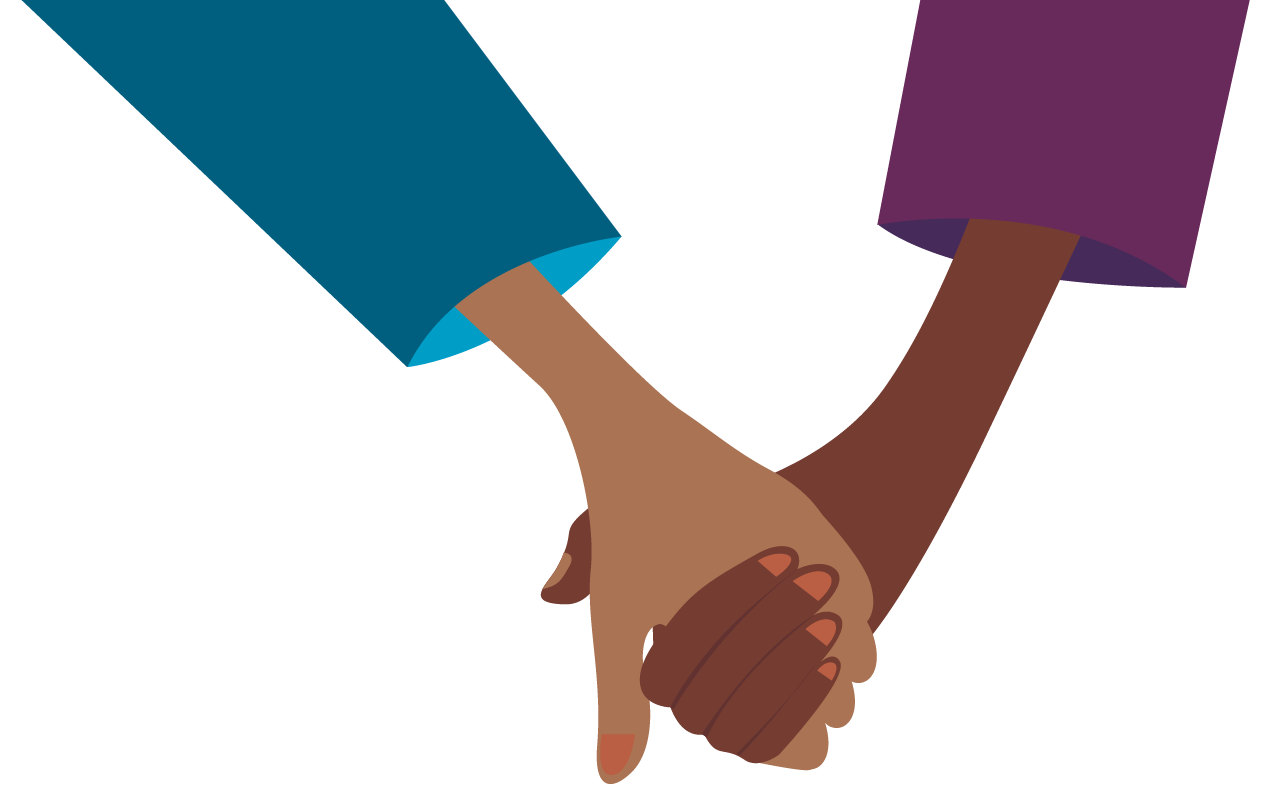
Home-based care
More than
100,000
clients were reached through frequent home-based care visits, providing services such as: health education, HIV testing and support for antiretroviral treatment, post-partum support, nutrition support, personal care support, and vaccinations. Of these clients, approximately
13%
were children and teens and
87%
were adults
Positive living
Over
260,000
people received HIV counselling and testing services. Almost 20,000 tested positive, and
64%
were women and girls
76%
of all clients are currently adhering to antiretroviral therapy as a result of holistic support
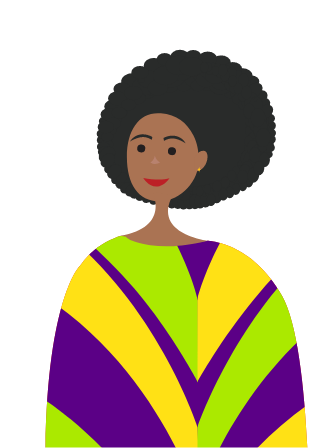
Children and young people
38,000
children and young people were reached through peer support groups by
57
partner organizations who covered topics such as: HIV prevention education, HIV disclosure, managing stigma and discrimination, sexual and reproductive health and rights, and nutrition
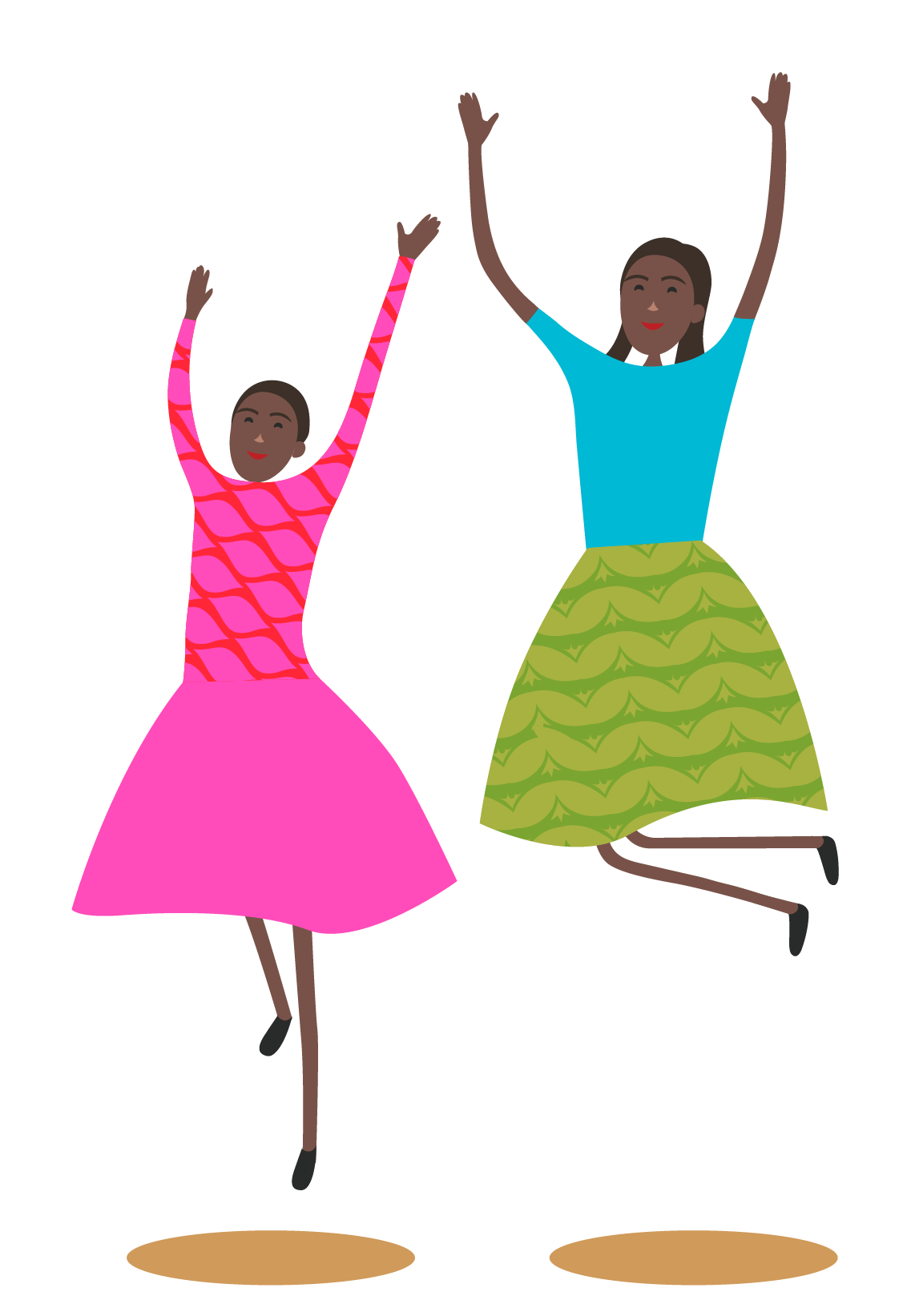
Health and human rights for LGBTIQ communities
Over
40,000
people were reached by
15
LGBTIQ organizations with health care, nutrition support, education and training, access to justice, human rights advocacy, COVID-19 support, and organizational strengthening
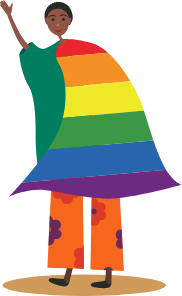
140,000
people were reached through different forms of psychosocial support
This includes support for staying on HIV medication, group and individual counselling, drug and substance abuse counselling, home-based health care support, monthly teen club meetings, play therapy, life skills programs, music and art therapy sessions, bereavement counselling, and support for those affected by COVID-19
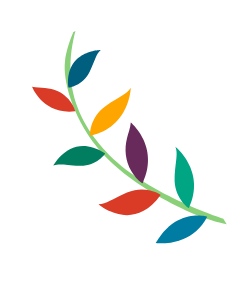
2021–2024 Strategic Plan
In 2021, we embarked on a three-year strategic plan to increase our support of our community-led partners in countries across sub-Saharan Africa. Envisioning the plan during COVID-19 lockdowns, both in Canada and countries where our partners work, provided a sobering reminder of the precariousness of advances in global health, including four decades of work to end AIDS.
HIV and AIDS remain a public health emergency with devastating impacts, disproportionately affecting adolescent girls and young women, vulnerable children, grandmothers, and LGBTIQ communities. In creating this strategic plan, we were guided by the expertise of our partner organizations, our donors, board members, and staff. Their ideas informed a way forward that will continue to provide communities with the funding they need to support people whose daily lives are affected by this disease.
As a progressive feminist foundation based in Canada, our strategic plan also commits to the learning and unlearning that is necessary to work in solidarity with our grassroots partners. Anti-oppression, anti-racist, and anti-colonial values guide our work, but we recognize that our very existence is a result of colonialism, and therefore we must be open to new perspectives and criticism as we fight for justice for all people and an end to the HIV and AIDS pandemic.
Our Four Strategic Directions
Strengthening and expanding our relationships with community-led organizations
Championing the power of progressive partnerships with community-led organizations
Nurturing a thoughtful, feminist organizational culture
Cultivating a thriving and engaged supporter base
Strengthening and expanding our relationships with community-led organizations
We advance progressive relationships with community-led organizations in sub-Saharan Africa through mutual learning, meaningful engagement, open communication, and an increase in flexible resources to support growth.
Championing the power of progressive partnerships with community-led organizations
We advocate for systemic change in philanthropic and international development sectors
through an intersectional feminist, anticolonial, anti-racist, rights-based approach.
Nurturing a thoughtful, feminist organizational culture
We consistently co-create a resilient organizational culture among staff, board members, volunteers and consultants, equally empowering all to flourish in their role.
Cultivating a thriving and engaged supporter base
We invest in and invite supporters to bolster the important work of the SLF and our partners, through sharing the achievements that their donations support.
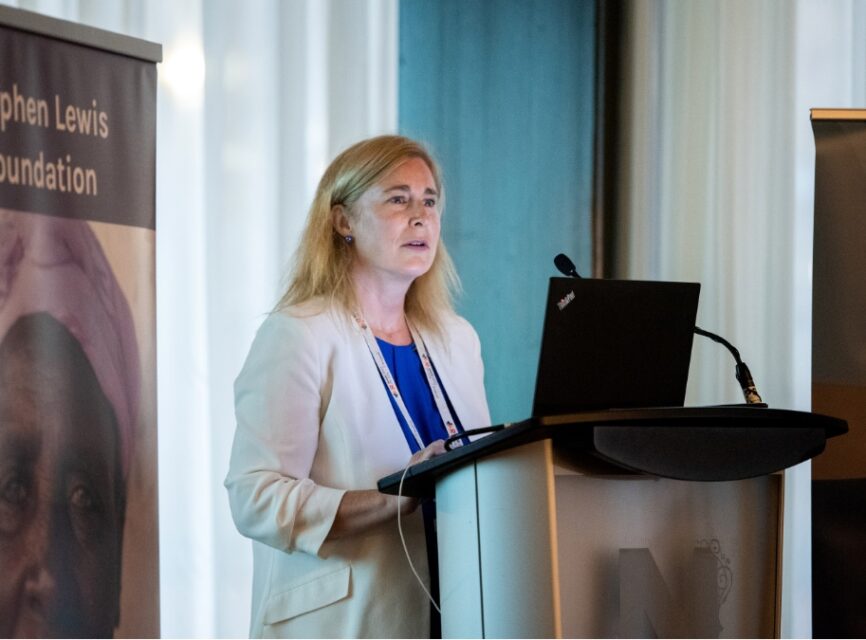
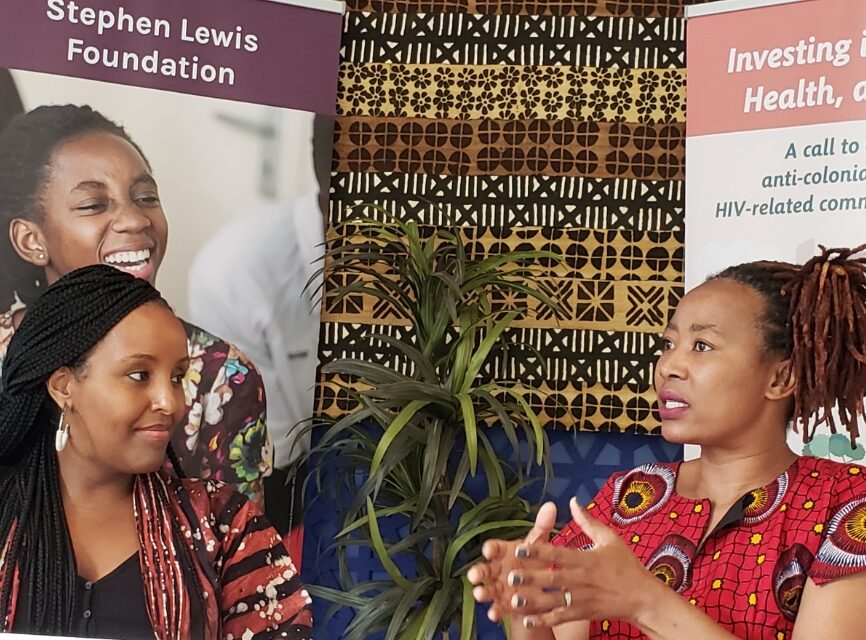
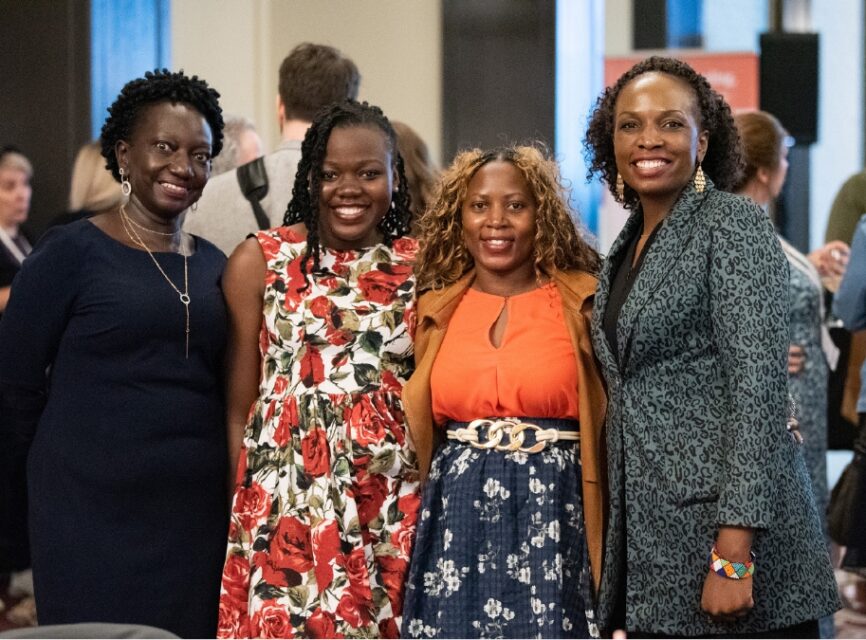
Photo Credit: Lacey Johnson
Nurturing a thoughtful, feminist organizational culture
Values
The Stephen Lewis Foundation is a feminist organization rooted in the principles of anti-colonialism and anti-racism. Our values reflect how these principles are expressed in our work, and in our relationships with partners, donors, and supporters.
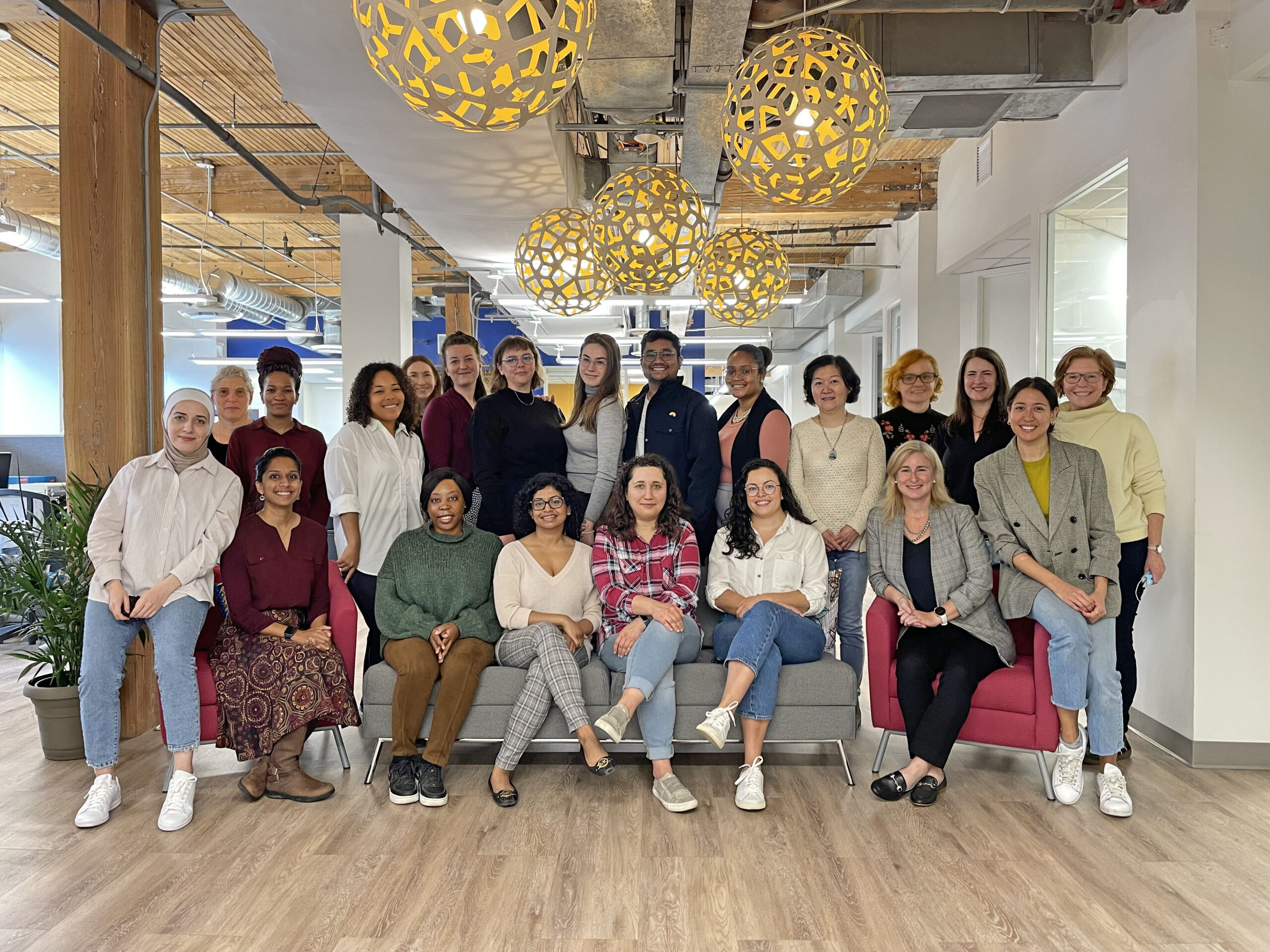
We are united with all who pursue justice in the HIV movement, including our African community-led partners whose expertise is critical to ending the pandemic, and with other justice-seeking movements working for a more equitable world.
We celebrate the generosity and purpose that drives our work and the joy of its impact.
We recognize the existence of systemic oppression, including the criminalization of people living with HIV and those within the LGBTIQ communities, and work toward the liberation, freedom, and realization of the rights of all people. We honour people’s lived experiences and unique identities.
We are defiant in the face of inequitable power structures and bring creativity, vulnerability, and strength to our work.
We value contributions from our partners, supporters, and each other, and actively cultivate relationships of mutual trust.
We meet our responsibilities, are transparent in our actions, and commit to ongoing learning and self-reflection.
Racial
Equity
This year, the SLF embarked on a racial equity journey to further understand our role in the oppressive systems that lead to racial inequality.
Truth and
Reconciliation
The SLF is committed to a journey of truth and reconciliation with Canada’s Indigenous peoples.
Living Wage
Employer
In reflection of our values as a feminist organization committed to social justice, the SLF became a certified living wage employer.
Racial
Equity
This year, the SLF embarked on a racial equity journey to further understand our role in the oppressive systems that lead to racial inequality. We established a staff-led Racial Equity Working Group that leads the SLF in learning and unlearning the systems that contribute to racial injustice. Through this lens, we are examining our policies and procedures to ensure those learnings are incorporated into our day-to-day work. Finally, we are committed to keeping staff engaged on this journey by creating safe spaces for racialized staff to meet, and attending events such as Future of Good’s Black Leadership in Social Impact Summit.
Truth and
Reconciliation
The SLF is committed to a journey of truth and reconciliation with Canada’s Indigenous peoples. We acknowledge the oppressive systems that have perpetuated a legacy of racism, intergenerational trauma, and structural inequality in Canada, and the impact that legacy has on disproportionate rates of HIV affecting Indigenous communities. This year, SLF staff collectively enrolled in the University of Alberta’s online Indigenous Canada course to further our understanding of the history and contemporary realities of Indigenous peoples in Canada.
Living Wage
Employer
In reflection of our values as a feminist organization committed to social justice, the SLF became a certified living wage employer. This means we compensate staff with a wage that reflects what people need to live in Toronto, Canada, where our office is located, as outlined by the Ontario Living Wage Network. This is one way we are building a strong, equity-focused organization with dedicated staff who can continue to fulfill our commitments to our African partners.
Partners in Pride
In Kenya, Uganda, Rwanda, Tanzania, and the Democratic Republic of Congo, the SLF’s Partners in Pride campaign supports 15 LGBTIQ organizations who are standing up for health and human rights in communities that are denied both. Thank you for joining us as we commit to raising $1 million a year in support of their work.
Being subjected to criminalization, political and social persecution, and pervasive homophobia and transphobia puts members of LGBTIQ communities at significantly higher risk of HIV. The human rights defenders leading these organizations put their safety on the line to provide health care, nutrition, education and training, access to justice, and human rights advocacy.
Their work is made possible by loyal SLF donors like Doug Stollery, a long-time Partners in Pride supporter who is moved by their courage. “Human rights are human rights,” says Doug. “Human rights are not a local issue. Human rights are an international issue. We all have a responsibility to help to ensure that every human being in the world has the basic rights that we should all have.”
In 2021, the SLF deepened its commitment to LGBTIQ human rights defenders by launching The Right to Health and Healing, a campaign in support of six Kenyan and Ugandan organizations to increase access to quality mental health and well-being programs for LGBTIQ communities. LGBTIQ leaders and the communities they represent consistently face direct and vicarious trauma with little or no access to meaningful mental-health care. This project, funded by the Government of Canada through Global Affairs Canada, in partnership with Equitas and the Dignity Network, will help protect their fundamental right to mental health.
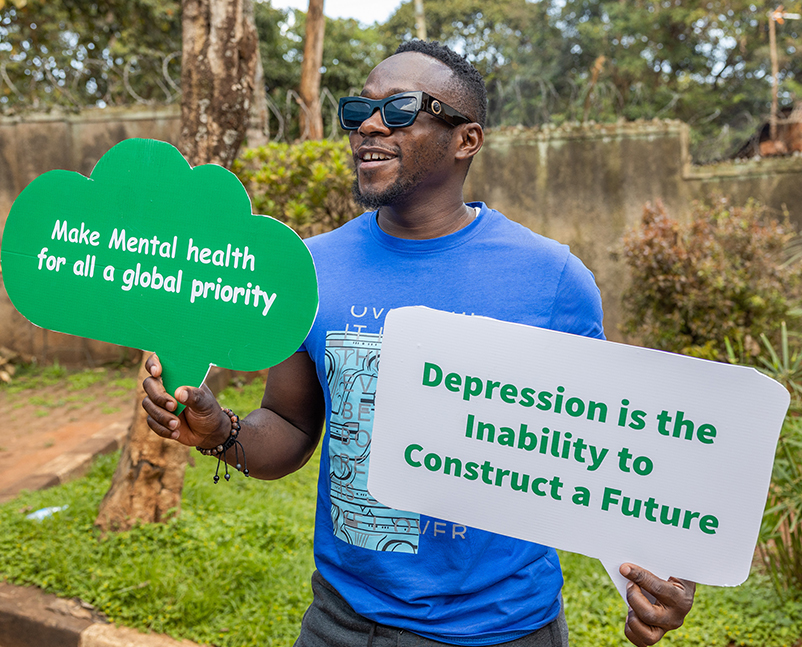
Photo Credit: Sofi Lundin
Description: Icebreakers
Location: Uganda
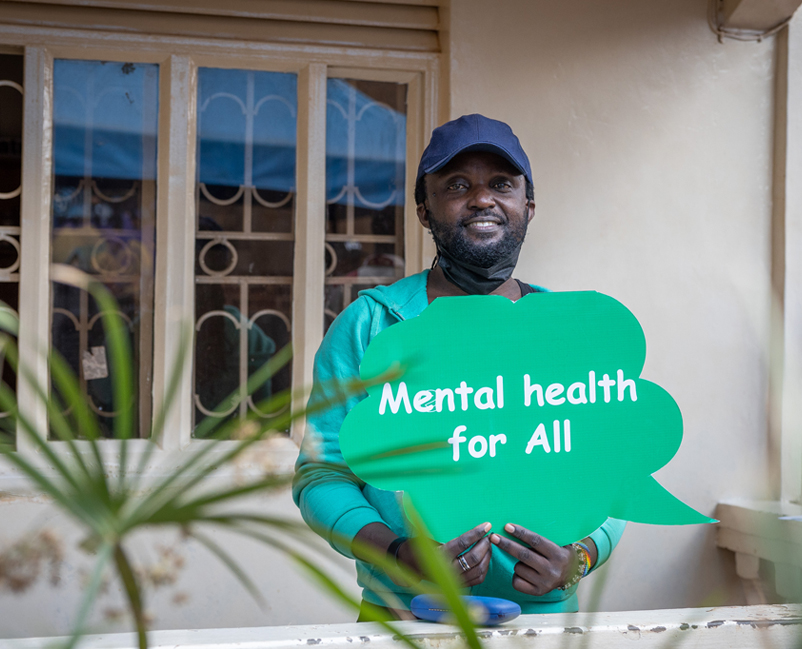
Photo Credit: Sofi Lundin
Description: Icebreakers
Location: Uganda
Grandmothers to Grandmothers Campaign
For more than 15 years, the Grandmothers to Grandmothers Campaign has championed the power and tenacity of grandmothers and grandothers across borders. It has forged deep connections between continents and within individual communities, and provided a meeting place where women can inspire and embolden one another. It’s a unique model of solidarity that raises a remarkable $2 million every year for the SLF.
In 2021, as African grandmothers persevered through COVID-19 restrictions, grandmothers groups in Canada also found innovative ways to connect, mobilize, and fundraise. Undaunted by new technology and logistics, the campaign’s 10,000 members were a force, organizing virtual events and online marketplaces. Once again, they showed a deep commitment to supporting African grandmothers raising a generation who lost their parents to AIDS-related illnesses.
Events like Stride to Turn the Tide, a fundraiser fuelled by everything from running and biking to gardening, went online. When it was safe, striders returned outdoors, including the Quinte Grannies in Belleville, Ontario. For 101-year-old Win Perryman, a 16-year veteran of the Campaign and one of the Quinte Grannies’ founders, support for the SLF is part of her lifelong commitment to creating a more equal world. “We all, wherever we happen to live, have to promote social justice,” she says. “Not just in our own country, but all around the world, and hopefully things will change.”
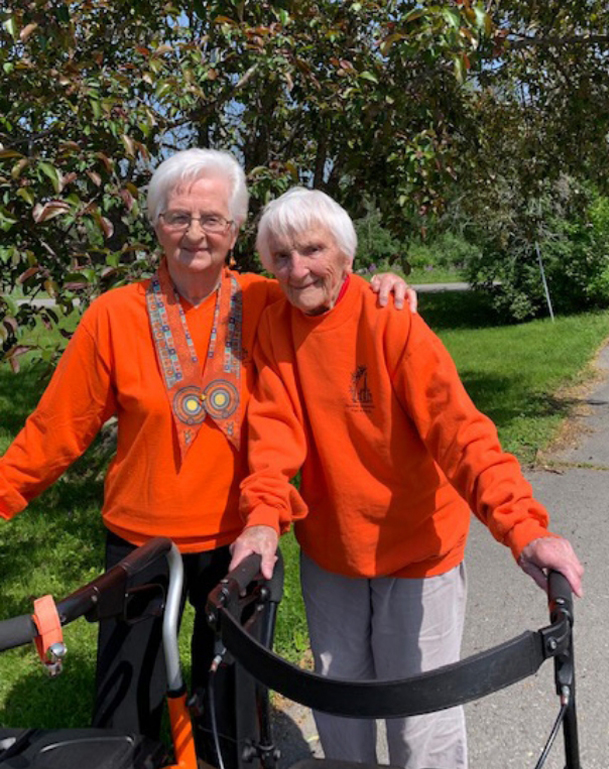
Photo Credit: Louise Coultas
Bernice Hassay and Win Perryman, Quinte Grannies
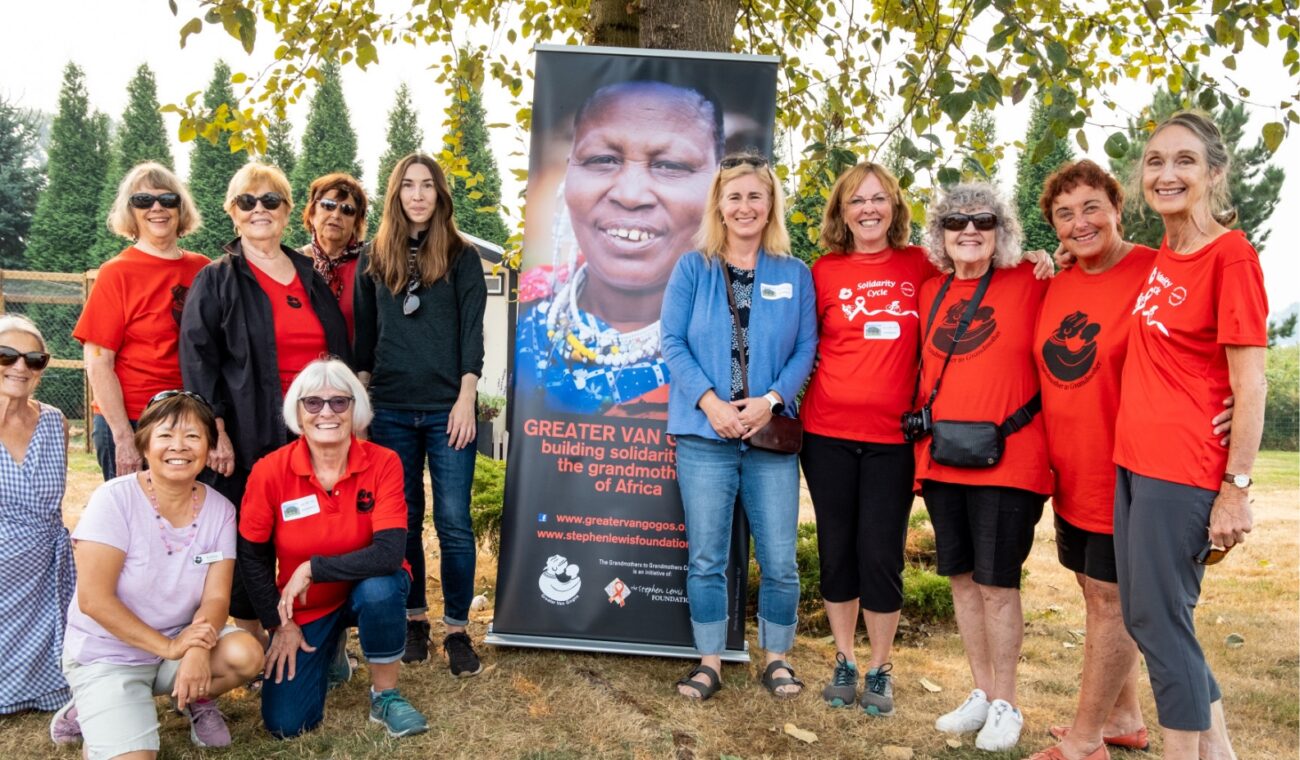
Photo Credit: Paula Simson
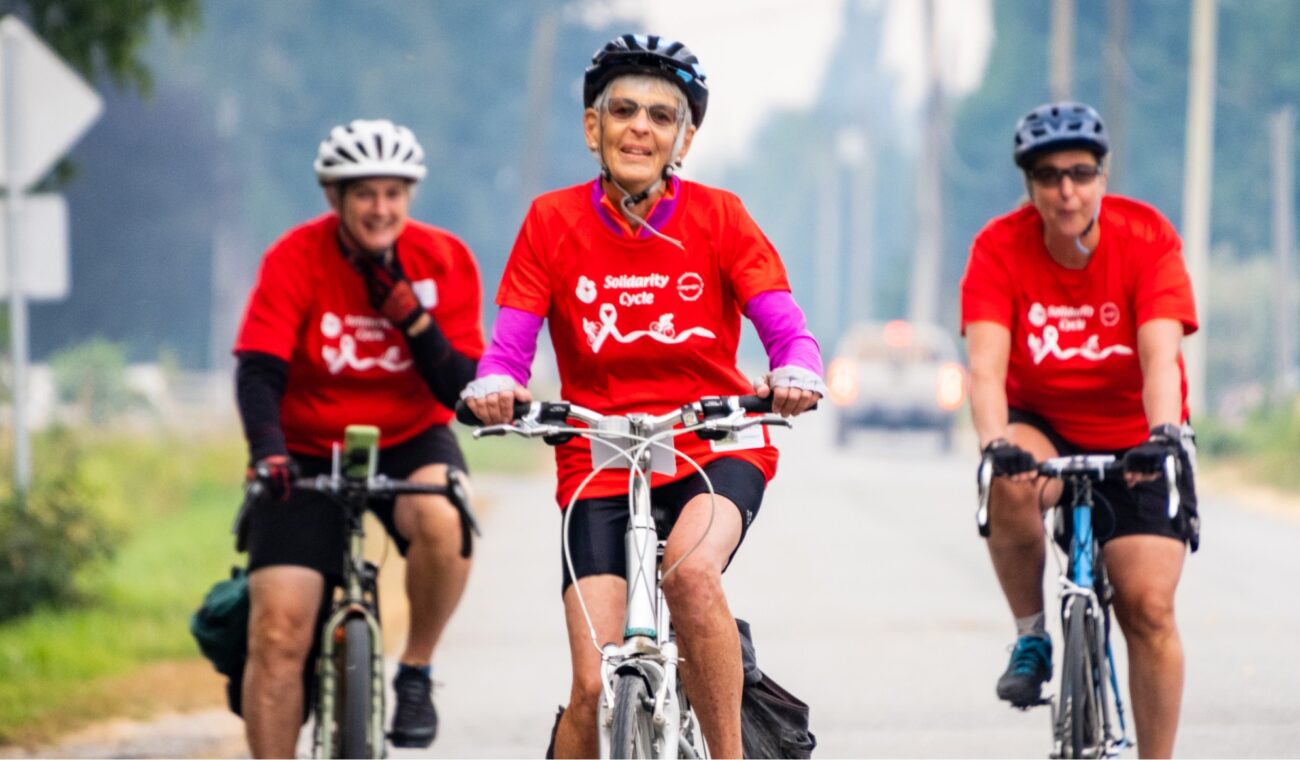
Photo Credit: Paula Simson
Greater Van Gogos’ Solidarity Cycle, 2022
Give a Day
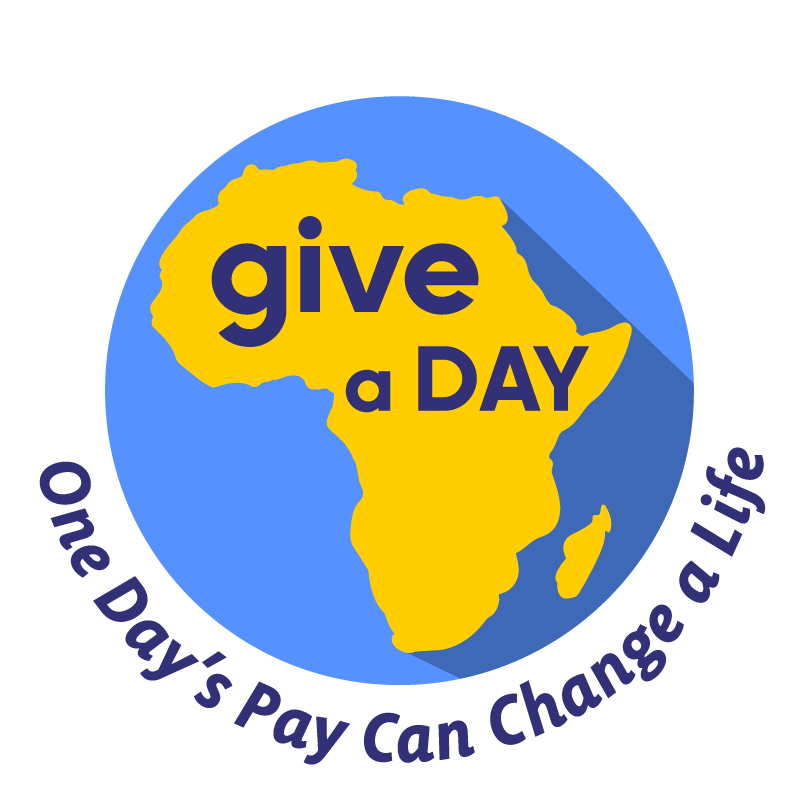
Give a Day is a grassroots movement that brings together co-workers with a common purpose to raise funds for the SLF’s community-led partners. In the spirit of ‘One day’s pay can change a life,’ generous donors show their collective commitment to ending AIDS by fundraising with colleagues throughout November, and giving the equivalent of one day’s pay on December 1, World AIDS Day. This inspiring team-building campaign has raised over $5.3 million since 2004 and branched out to Give a Night, a campaign led by articling students who understand the value of demonstrating their commitment to ending AIDS in a tangible way.
Give a Day’s success lies with champions like Michael Fekete, partner at Osler, Hoskin & Harcourt LLP, who is inspired by the SLF’s innovative and transformative model of international development. “It’s a brilliant model for supporting people on the ground in local communities,” he says, noting that communities are working not just to end AIDS, but for social justice and equality. “Fundamentally, the Foundation is about bottom-up development and capacity building and resilience … I just think it’s incredibly powerful.”
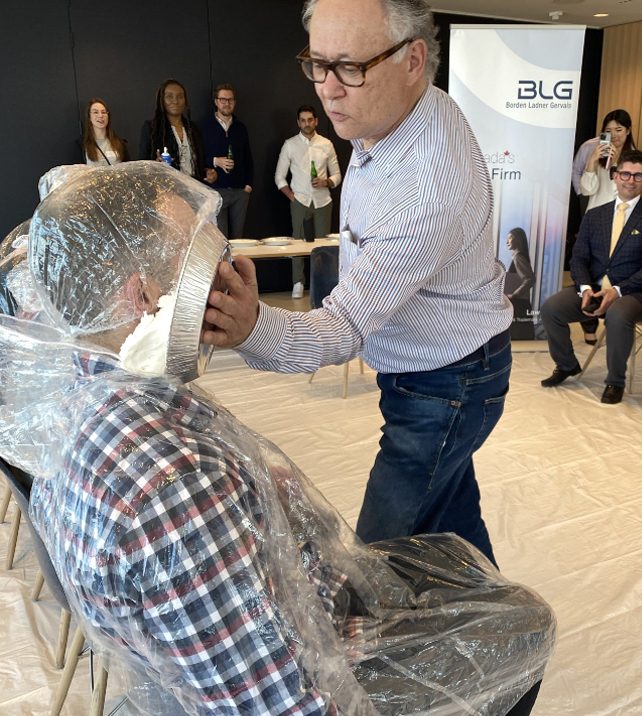
Borden Ladner Gervais held a “Pie A Lawyer” event to raise funds for Give a Night
Financial Accountability
From July 2021–June 2022 the Stephen Lewis Foundation raised $9.4 million dollars in support of 122 organizations in 15 countries, bringing our total fundraising since 2003 to more than $183 million.
Where our support comes from:
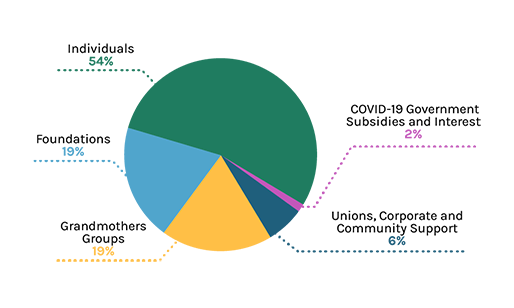
Where your money goes:
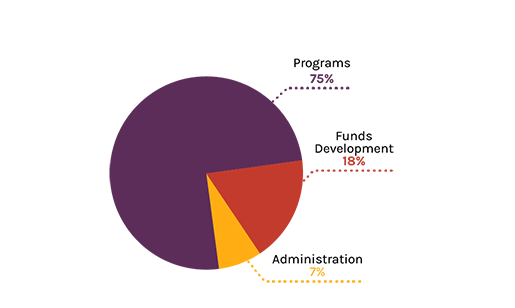
Our programs support by area of work:
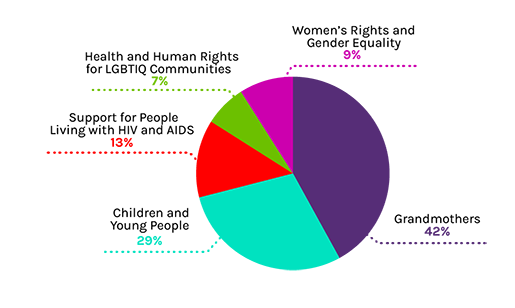
Programs
We are committed to delivering sustainable, impactful funding to our African partners and advocating for greater investment in their work. In 2021–2022, more than $8.1 million was spent in supporting the work of our partners, representing 75% of total expenses for the year.
Administration
Costs associated with day-to-day operations ensure a strong infrastructure for the SLF, and accountability for how the funds we raise are allocated. In 2021–2022, our administrative costs were 7% of our total spending.
Funds Development
In keeping with our 2021–2024 strategic plan, we have strengthened our fundraising capacity to ensure we can continue to grow our support for the innovative programming developed by our African partners. This past year our fundraising costs were 18% of total spending.
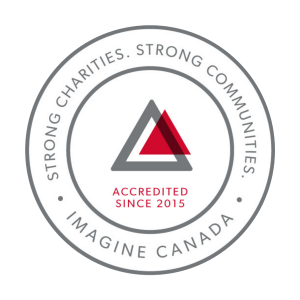
In 2022 we renewed our accreditation with the Imagine Canada Standards Program for demonstrated excellence in board governance, financial accountability and transparency, fundraising, staff management, and volunteer involvement.
For a copy of the Foundation’s full audited financial statements and the link to our annual Canada Revenue Agency (CRA) charity returns, please visit: stephenlewisfoundation.org/who-we-are/financials
The Foundation’s fiscal year runs from July 1st to June 30th. Our auditors are Grant Thornton LLP Chartered Accountants. The Foundation’s charitable number is 89635 4008 RR0001.
